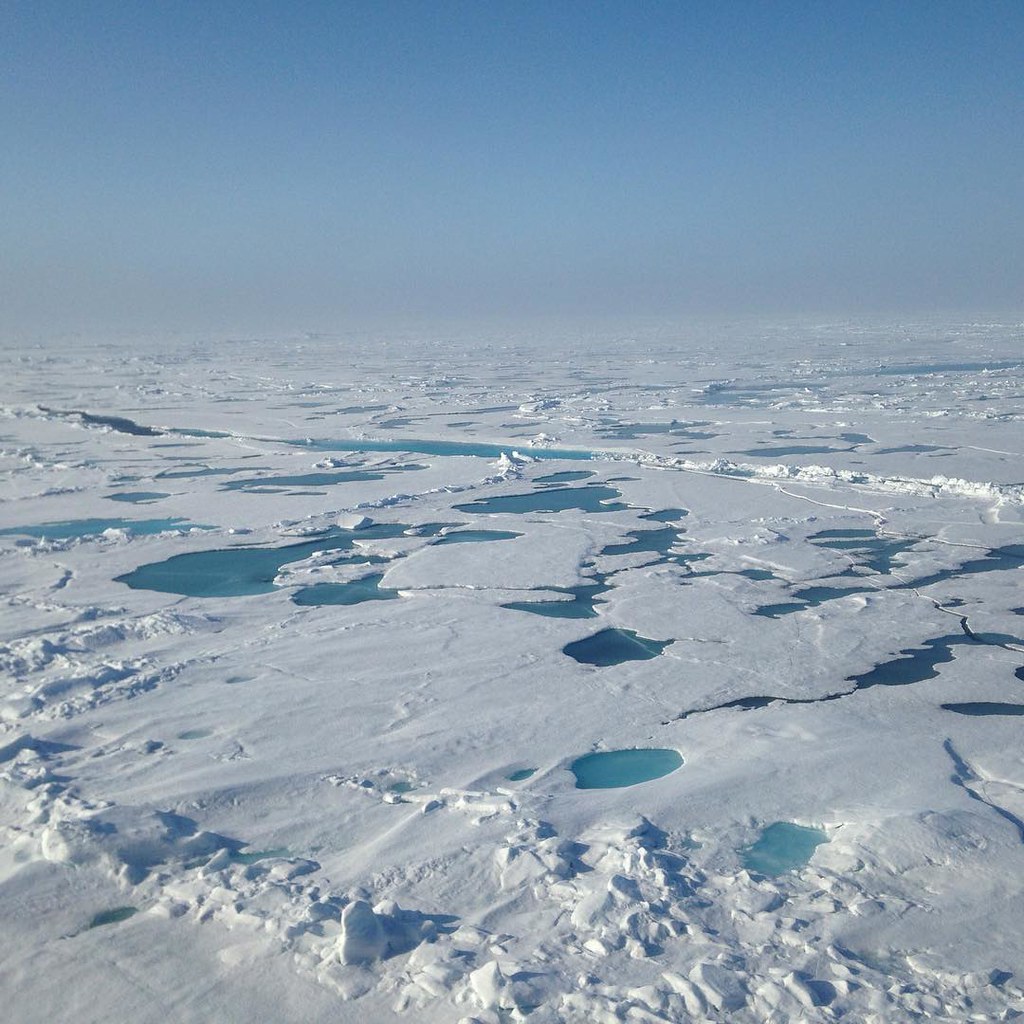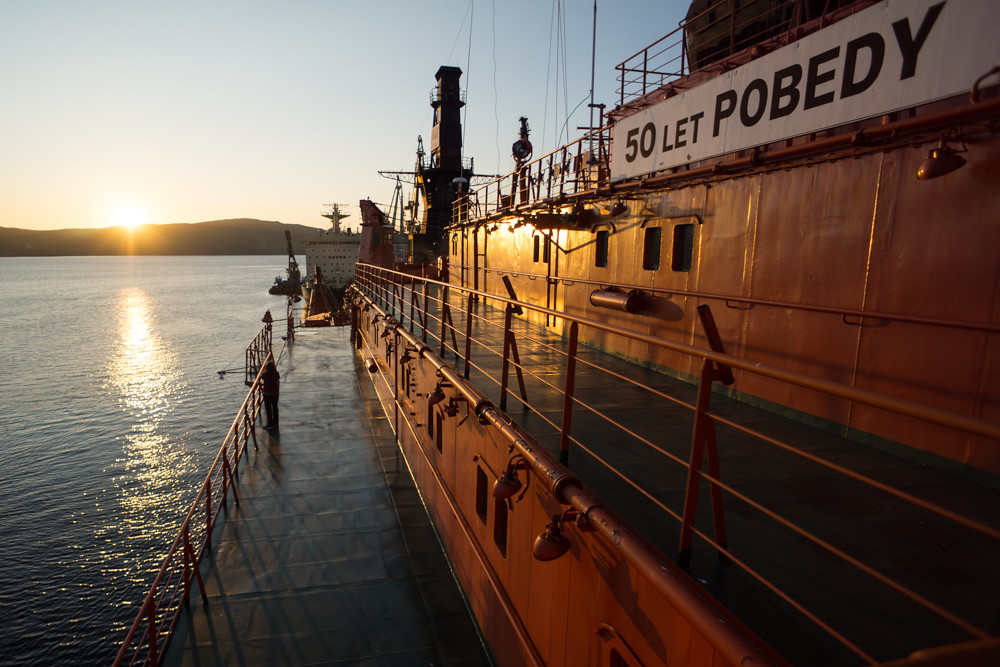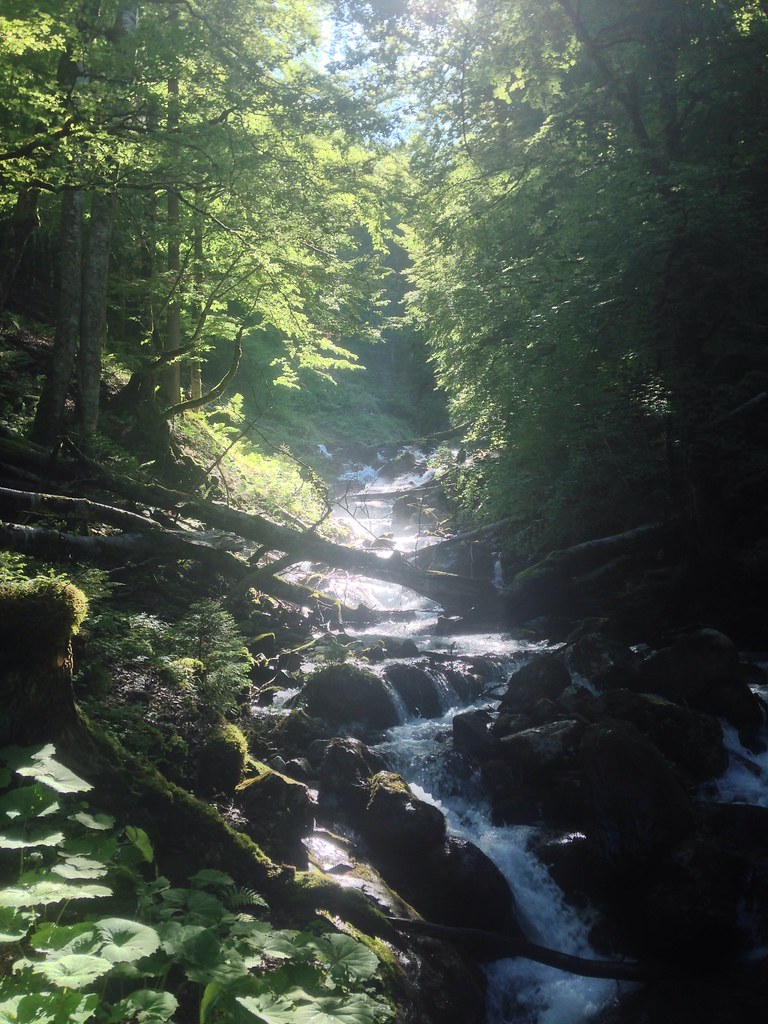
Cold and/or remote parts of the world; beautiful scenery, spectacular wildlife and thoughts on science and the natural world.
Friday, 31 July 2015
Champ Island Glacier, Franz Josef Land

Citizen Science at the North Pole Measuring melt pond sizes,...
Citizen Science at the North Pole
Measuring melt pond sizes, depths and salinities at the North Pole with our team of citizen scientists. The trip was fantastic and we had an excellent core group of ice observers. Now we are gearing up for the next one!
Friday, 24 July 2015
Extremely Northern Polar Bears?Last cruise, July 12th, we saw a...
Extremely Northern Polar Bears?
Last cruise, July 12th, we saw a mother Polar bear with two cubs. What was remarkable to us was their latitude; a very respectable 85 05′N 62 34′E.
Why is this unusual? Well, the central Arctic is a bit of a desert. It’s not for lack of primary productivity, so it may be due to a lack of open water most of the year. A LOT of life in the Arctic is concentrated at the ice edge and in polynyas. Polynyas are concentrated around the rim of the Arctic Ocean, leading to this rim sometimes being dubbed the “Arctic Ring of Life”. Open water is required for mammals like whales and seals to breathe, and for bears to be able to access these animals to hunt. Perhaps the summer is too short to encourage many animals to venture so far south into the newly opening leads of water, but it seemed there was time enough for this adventurous trio.
The cubs were very large, almost as big as mum, perhaps indicating an age of 2 years+ or thereabouts. The further north bears are the longer they seem to spend with mum before they leave, so they could be older than the average 2-2.5 years age at which they separate.
Bears are a constant source of mystery and excitement to me, and every one is a privilege to see. But these ones were just a little bit more mysterious than most.
Thursday, 23 July 2015
Wednesday, 22 July 2015
Helicopter operations in the Arctic OceanWe have been using the...
Helicopter operations in the Arctic Ocean
We have been using the helicopter tours to collect video data on the melt pond coverage; this is important as the more melt ponds there are, the more of the sun’s energy the ocean absorbs. The white ice reflects heat into space but for a long time climate models assumed that all of the ice was reflective. Now the ponds are being included but we need to work out just how much of the Arctic is covered by them and how they are evolving through the season.
Tuesday, 21 July 2015
Bowhead Whales in the Arctic OceanI have written before about...
Bowhead Whales in the Arctic Ocean
I have written before about the mystery and romance of the Arctic and the Bowhead’s place in that in a previous post.
A few days ago I finally had an opportunity to see them in the Arctic archipelago of Franz Josef Land. The Barents Sea population, of which these individuals are a part, is estimated at tens to hundreds so we felt doubly blessed to see more than a dozen of them.
While we saw some mature adults from a distance, all of those that swam close to the ship when we slowed down appeared to be young, lacking the white lower jaw.
I feel genuinely privileged to have seen these animals. To me they are an emblem of the Arctic, being the most ice-adapted of any any whale and playing such a large part in human survival and history.
Monday, 20 July 2015
Data Collection at the North PoleMy first time ever to the North...
Data Collection at the North Pole
My first time ever to the North Pole and the weather was gorgeous! It took several hours of searching with the helicopter to find a suitable spot a few miles from the pole itself, and Lauren had the luck to be along for the hour-long ride.
After enjoying the sunshine and scenery we get down to work, measuring the dimensions and salinity of two ponds. This all went surprisingly well for a first attempt and we learned enough to know what we want to measure next time and how we will include guests in the process.
Sailing to the North Pole is an expedition cruise like no other. It was a special experience, more so than I expected, and I’m really happy that the science went well too! I’ll be back three more times this summer and I can’t wait.
The #Arctic is the most beautiful place in the world.

Helicopter operations in the Arctic Ocean

Sunday, 19 July 2015
I’ve just returned from two weeks of breaking ice in the Arctic...
I’ve just returned from two weeks of breaking ice in the Arctic Ocean. Icebreaking is incredible, helicopters are amazing and we learned a huge amount about observing sea ice and recording data about it.
Thursday, 9 July 2015
Midnight sun in Murmansk

Wednesday, 8 July 2015
lauren:We’re in Murmansk at nuclear base Atomflot and we’ve...
We’re in Murmansk at nuclear base Atomflot and we’ve boarded 50 let Pobedy, the most powerful ship in the world. It’s 11:30pm and we’re enjoying the endless golden hour.
Tomorrow we’ll welcome our first set of guests and begin our first of four voyages to the North Pole!
Lauren took this photo of me tonight on deck. The ship is vast and industrial and very Russian i.e. everything I hoped. It’s also fantastic to be back in the Arctic where golden hour lasts for hours and hours.
Tuesday, 7 July 2015
Murmansk I’m really excited to see this industrial...
Murmansk
I’m really excited to see this industrial Russian city above the Arctic circle. Only a century old, it was destroyed in the Second World War.
I’ve visited the Russian (well, Soviet originally) outpost towns of Barentsburg and Pyramiden in Svalbard, and I’m struck by the fact that although Murmansk is bigger, wealthier, more vibrant and cleaner than either there are so many similarities. The smells of strong cigarettes, coal smoke, cologne, sweat and earth. The buildings in the exact same slightly dilapidated state. The architecture, the vehicles, the detritus. The public art and the typography, even the layout of the streets.
Russia seems to me an exotic place, which can be surprising to some of us in Europe or North America because many Russians, at least in the west of the country, look just like us. But it seems a very different place culturally. I’m very happy to be here.
Tomorrow we travel to Atomflot to board a nuclear icebreaker bound for the North Pole.
Monday, 6 July 2015
Alpine forest

Sunday, 5 July 2015
lauren: Polar explorer Roald Amundsen’s house outside of Oslo,...
Polar explorer Roald Amundsen’s house outside of Oslo, Norway.
I’m in Norway with Lauren. Today we visited the Fram museum and Roald Amundsen’s house. Heading north for the North Pole
Thursday, 2 July 2015
From Lake Geneva to central London, back in the UK and packing...
From Lake Geneva to central London, back in the UK and packing for the North Pole.
Wednesday, 1 July 2015
lauren: Yesterday I was given The Explorers Club flag we’ll be...
Yesterday I was given The Explorers Club flag we’ll be carrying during our sea ice data collection program this summer. To be awarded a flag for your expedition means your efforts have been recognized by The Explorers Club as furthering the cause of exploration and field science.
Flag #69 took its first expedition during the total solar eclipse of 1937 in the Andes. Since then, it has been to the Himalayas to explore the Raikot Glacier, to Antarctica for a whale song study, to South Georgia and even to the shipwreck of the Titanic. And now, Alex and I will take it to the Geographic North Pole.
It’s an incredible honor and yes, I will be treating our flag like a baby! A very, very old and fragile baby.
Lauren picked up our Explorers Club flag yesterday at the New York clubhouse. Our trip starts very soon!
lauren: I’m at The Explorers Club this afternoon to pick up the...
I’m at The Explorers Club this afternoon to pick up the flag that Alex and I will carry to the North Pole this summer. Feeling very sentimental!
Can’t ever come here without picking up wine first, it’s a tradition.
